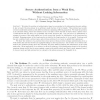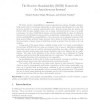179 search results - page 33 / 36 » Adversarial Leakage in Games |
CRYPTO
2010
Springer
13 years 7 months ago
2010
Springer
The Virtual Black Box (VBB) property for program obfuscators provides a strong guarantee: Anything computable by an efficient adversary given the obfuscated program can also be co...
ASIACRYPT
2011
Springer
12 years 7 months ago
2011
Springer
The assumption of the availability of tamper-proof hardware tokens has been used extensively in the design of cryptographic primitives. For example, Katz (Eurocrypt 2007) suggests ...
IACR
2011
12 years 7 months ago
2011
We study the problem of authentication based on a weak key in the information-theoretic setting. A key is weak if its min-entropy is an arbitrary small fraction of its bit length. ...
SOFSEM
2010
Springer
14 years 4 months ago
2010
Springer
Regret minimization has proven to be a very powerful tool in both computational learning theory and online algorithms. Regret minimization algorithms can guarantee, for a single de...
IANDC
2007
13 years 7 months ago
2007
We define reactive simulatability for general asynchronous systems. Roughly, simulatability means that a real system implements an ideal system (specification) in a way that pre...


